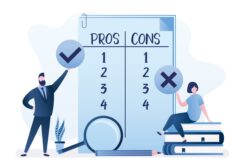Divorce didn’t just transform Beatrice Leong’s personal life — it gave her a career.
Leong was about to finish law school with a dream of becoming a prosecutor when she learned her now-former husband was cheating on her. The pair had been high school sweethearts. They met in the early 2000s while working together for a summer at the old Mets’ Shea Stadium in Queens, and they dated for about 10 years before getting married.
She had “that image of ‘The Notebook,’ of us growing old together,” she said. The infidelity, which she discovered just two years after their wedding, was heartbreaking for her. “My dream marriage and my dream life of how I planned it quickly dissipated.”
As she started to think about getting a divorce, she realized she didn’t just want to learn about the subject for herself. She wanted to become an expert in the field and help other people navigate the same challenges. Instead of joining a prosecutor’s office, she went to work for a divorce law firm. “My own divorce triggered the rest of my life,” she said.
But even as a lawyer specializing in divorce, she still made mistakes handling her own. Leong, who now has her own practice in Manhattan, agreed to talk frankly with The Exit about her missteps, what she learned, and how she helps clients avoid similar pitfalls.
Keep track of your stuff during a break up
Feeling “shattered,” Leong moved out of her marital home and back to her mother’s house, where she was sleeping in her “little twin-sized childhood bed.” “Everything had crashed in front of me,” she added.
Eventually, she realized that in her haste to get away from her ex, she made a “big mistake:” She had forgotten to make an inventory of her belongings. Soon-to-be ex-spouses can be held liable for throwing out your stuff, but it’s hard to make that case unless you have a detailed record of what was lost.
“He ended up throwing out like a $3,000 couch,” along with personal memorabilia, like Leong’s wedding guestbook, she said. “My grandmother signed it, my grandpa signed it and now they’re dead and I don’t have it anymore,” she said.
Looking back, she said she should have done a “careful check” before leaving and told him to avoid throwing anything away until they reached a divorce agreement. Now when she advises clients, she usually instructs them to do the same.
“Sometimes people are forced to move out right away, if there’s violence or other reasons,” she said. But whenever possible, it’s still best to make an inventory, she added.
Don’t negotiate for yourself
Another trouble spot for Leong was thinking she could handle the negotiations with her ex by herself. While she was confident in her knowledge of the law, emotions sometimes got the better of her, though.
High-functioning professionals, including lawyers, often fall into that trap, she said. Even if you can be a tough negotiator on someone else’s behalf or do multimillion-dollar business transactions, feelings can still get the better of you when you’re dealing with someone you once loved.
“My clients are brilliant people — educated doctors, lawyers, and so on,” she said. “But then again emotions always block the logical side of the brain.”
Tugged by sympathy and bygone affection, you might find yourself giving in too easily on certain points and suffering regret later. Or simmering acrimony could turn the negotiation into a brutal battle.
“If your husband and or your wife and you are very logical people, and you can sit down practically and talk about it without crying about who did what, great,” Leong said. “But most people can’t do that. So I would say let your lawyers handle it without the emotional attachment.”
Leong said that in hindsight her divorce process “took a little longer than I liked” because she did it herself. She thought the settlement was ultimately “fair,” but the process would have been less painful and drawn-out if another lawyer did the negotiating for her.
Do financial checkups
This wasn’t a problem Leong ran into in her own divorce, but it’s a source of angst that comes up frequently in cases for her clients. People getting divorced can often find themselves shocked by the discovery of debts or bills they didn’t know existed, or that their spouses might have been hiding from them.
In some cases, clients might have left all the financial matters to their spouse, and just not thought about it, she said. But even if you weren’t aware of the debt, you might still get stuck with a substantial portion of it in a divorce.
To avoid that scenario, even if you are not contemplating a divorce, “I would say maybe do a financial check in here and there and just say, ‘Hey, are we OK? Are there any debts or things I should be worried about?,” Leong said. “And if your spouse is very secretive, then I would say, that’s when you start getting credit reports.”
As luck would have it, it was while Leong was checking into the couple’s cell phone bills that she discovered evidence that her husband had been having an affair.
Be aware of the law
Another thing Leong got right, thanks to her legal training, was learning about what policy developments in New York could have an impact on her divorce and strategizing accordingly. The situation could have ended very badly for her if she did not take those precautions.
Up until January 2016, professional licenses — such as law or medical licenses — were considered “marital property” in New York. That meant a license’s “value,” or potential future earnings, would be factored into who gets what. Using that type of analysis, Leong, a newly-minted lawyer, could have been left with little or nothing in a divorce.
When she learned her ex-husband had cheated on her, the old law was still in effect. Leong realized it was best for her to wait until the new law was implemented for her to file for divorce. So she waited for more than a year.
“Had I filed early, my husband would have a claim to my law degree,” she said. “So, I strategically could not file until this law passed. As soon as the law passed, I went and filed for a divorce. I wouldn’t have known that unless I went into the field myself.”






